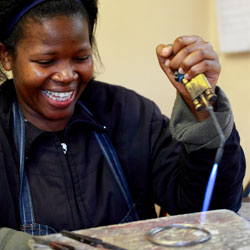Africa
At Gone Rural, over 750 rural Swazi women earn a living by weaving highly intricate baskets, bowls, and placemats. In Swaziland, rural families suffer from illiteracy, high rates of HIV/AIDS, and extreme poverty. Through participation in Gone Rural’s skill training courses, these women are able to provide for their families.
At Imvelo Eswatini, Swazi women living in informal urban settlements have a chance to earn a fair living through meaningful artisan work. Imvelo Eswatini strives to offer holistic support to its artisans, and provides women’s rights and health education alongside craft skills training.
As a social enterprise in Madagascar, Ivahona brings much needed work to talented artisans who would otherwise be hard-pressed to find a market for their handcrafted goods. Despite being rich with natural resources, Madagascar is one of the poorest countries in the world.
Maasai Women Development Organization (MWEDO) works to give a voice to pastoral Maasai women in remote, impoverished regions of Tanzania. Through the creation and sale of traditional beaded jewelry, MWEDO provides a living wage, health services, advocacy training and education to women of the Maasai tribe.
Sabahar is a fair trade enterprise that celebrates Ethiopia’s age-old textile traditions, combining handspinning and hand-weaving with contemporary design and craftsmanship. Sabahar currently employs 50 people at its workshop in Addis Ababa and engages another 100 artisans who spin and weave in their own homes or in cooperatives around the city.
Few jobs are offered to South Africans with little formal education, but at Streetwires, 120 artisans in Cape Town and Johannesburg earn sustainable incomes through the sale of their wire and bead creations.
Swaziland Fair Trade (SWIFT) is a member-based organization that works with 25 groups to employ 5,000 artisans. SWIFT member groups provide a wide variety of artisan jobs including weaving, jewelry-making and ceramics and provides their artisans with medical care and education programs.
For over 100 years, artisans of Tigmijou, Morocco have been weaving local water reeds into beautiful products. Today, the Tigmi Bag Association is one of the largest producers of reed baskets in Morocco and the popularity of the Tigmi Market Bag serves as a primary source of income for the community.

TRADEAID
Ghana
Tintsaba works with 900 Swazi weavers to create jewelry from locally-sourced sisal fiber. In addition to earning a living, homeopathic healthcare is provided for the artisans from mobile clinics, and HIV/AIDS awareness courses are taught regularly.
The weaving of traditional Bolga Baskets is a major source of income in Bolgatanga, Ghana where 90% of people live below the poverty line. TradeAID was founded to provide fair trade wages to these artisans, as well as provide support to women entrepreneurs.









